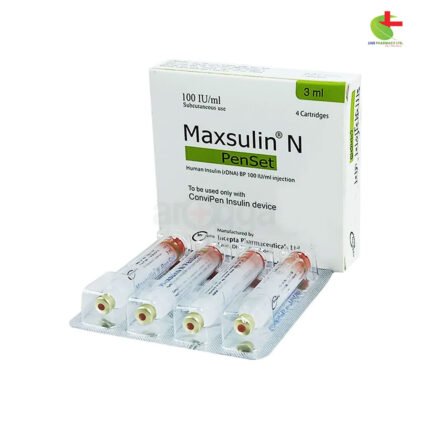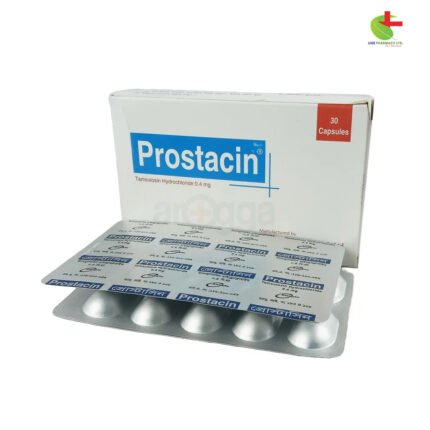Beuflox IV
146.00৳ Bottle (100ml)
- Beuflox is an antibiotic indicated for treating single or mixed infections caused by susceptible organisms, including those resistant to other antibiotics.
- It contains Ciprofloxacin, a synthetic quinolone with a broad spectrum of activity against various gram-negative and some gram-positive bacteria.
- The recommended dosage varies based on the type and severity of infection, with specific adjustments for certain populations like children and those with renal impairment.
- Common side effects may include gastrointestinal disturbances and central nervous system effects, and its use during pregnancy and lactation is not recommended.
 Brand
Brand
|
Incepta Pharmaceuticals Ltd |
|---|---|
 Generics
Generics
|
Ciprofloxacin |
 Type
Type
|
IV Infusion |
Indications
Beuflox is prescribed for treating both single and mixed infections caused by one or more susceptible organisms. It is particularly effective against infections stemming from bacteria resistant to other antibiotics, such as aminoglycosides, penicillins, and cephalosporins.
As an antibacterial agent, Beuflox should be taken under the guidance of a registered medical professional.
Pharmacology
Ciprofloxacin, a synthetic quinolone anti-infective agent, boasts a broad spectrum of activity. It effectively combats most gram-negative aerobic bacteria, including Enterobacteriaceae and Pseudomonas aeruginosa. Additionally, Ciprofloxacin targets gram-positive aerobic bacteria, including both penicillinase-producing and non-penicillinase-producing staphylococci, although it may show reduced effectiveness against certain streptococci strains. Its bactericidal effect is due to interference with DNA gyrase, an enzyme crucial for bacterial DNA synthesis. Upon oral administration, Ciprofloxacin is rapidly and effectively absorbed from the gastrointestinal tract, with a distribution throughout body tissues and fluids. The elimination half-life is approximately 3.5 hours, and between 30% to 50% of an oral dose is excreted unchanged in urine within 24 hours, along with biologically active metabolites.
Dosage
General Dosage Guidelines: The recommended dosage of Ciprofloxacin varies based on the infection’s severity and type, the sensitivity of the causative organisms, and patient-specific factors such as age, weight, and renal function.
- Adults: Typical dosage ranges from 100 to 750 mg, taken twice daily.
- Lower and Upper Urinary Tract Infections: 250-500 mg twice daily, depending on severity.
- Respiratory Tract Infections: 250-500 mg twice daily; for known Streptococcus pneumoniae infections, 750 mg twice daily is advised.
- Gonorrhea: A single dose of either 250 or 500 mg.
- Other Infections: 500-750 mg taken twice daily is common.
- Cystic Fibrosis: For adults with pseudomonal infections in the lower respiratory tract, the standard dose is 750 mg twice daily. The pharmacokinetics in cystic fibrosis patients do not change, but low body weight should be considered for dosage determination.
- Impaired Renal Function: Adjustments are rarely needed unless there is significant renal impairment (serum creatinine > 265 µmol/L or creatinine clearance < 20 mL/min). In such cases, the total daily dose may be halved, with serum drug levels providing the best basis for adjustments.
- Elderly Patients: No dosage adjustment is necessary, even with higher serum levels observed in older adults.
- Adolescents and Children: Ciprofloxacin may cause joint issues in immature animals; thus, its use in growing children and adolescents is not recommended unless the benefits outweigh potential risks. If deemed necessary, the dosage should range from 7.5 to 15 mg/kg/day, divided into two doses.
Duration of Treatment: Treatment duration is contingent on the infection’s severity, clinical response, and bacteriological results. For acute infections, the typical treatment period is 5 to 10 days with Ciprofloxacin tablets, extending for three days post symptom resolution.
Extended-Release Tablets:
For uncomplicated urinary tract infections (acute cystitis), a recommended dose of 1000 mg extended-release tablet is prescribed once daily for three days.
IV Infusion Dosage:
- Urinary Tract Infection: Mild to Moderate: 200 mg every 12 hours for 7-14 days; Severe or Complicated: 400 mg every 12 hours for 7-14 days.
- Lower Respiratory Tract Infection: Mild to Moderate: 400 mg every 12 hours for 7-14 days; Severe or Complicated: 400 mg every 8 hours for 7-14 days.
- Nosocomial Pneumonia: All severities: 400 mg every 8 hours for 10-14 days.
- Skin and Skin Structure Infections: Mild to Moderate: 400 mg every 12 hours for 7-14 days; Severe or Complicated: 400 mg every 8 hours for 7-14 days.
- Bone and Joint Infections: Mild to Moderate: 400 mg every 12 hours for over 4-6 weeks; Severe/Complicated: 400 mg every 8 hours for over 4-6 weeks.
- Intraabdominal Infections (Acute Abdomen): Complicated: 400 mg every 12 hours for 7-14 days.
- Acute Sinusitis: Mild to Moderate: 400 mg every 12 hours for 10 days.
- Chronic Bacterial Prostatitis: Mild to Moderate: 400 mg every 12 hours for 28 days.
Note: Always consult a registered medical professional for medication use.
Administration
Instructions for Ciprofloxacin IV Infusion:
- Inspect the bag for leaks by squeezing the inner bag; discard if leaks or seal issues are found.
- Avoid using if the solution appears cloudy or has precipitates.
- Do not use flexible bags in series connections.
- Close the flow control clamp of the administration set.
- Remove the cover from the port at the bottom of the bag and insert the administration set’s piercing pin with a twisting motion until secure.
- Hang the bag and adjust the drip chamber level during infusion.
- Open the flow control clamp to expel air and then close it.
- Control the administration rate with the flow control clamp.
Note: Always consult a registered medical professional for medication use.
Interactions
Avoid concurrent use of Beuflox with magnesium or aluminum-containing antacids, sucralfate, or products containing calcium, iron, or zinc. These substances should be taken two hours after or six hours before Beuflox. Additionally, Beuflox should not be consumed alongside milk or dairy products, as they can significantly reduce absorption. However, dietary calcium during meals does not notably affect Beuflox absorption.
Contraindications
Beuflox is contraindicated in individuals with a history of hypersensitivity to Ciprofloxacin or other quinolone antibiotics.
Side Effects
Possible side effects include gastrointestinal disturbances such as nausea, diarrhea, vomiting, dyspepsia, and abdominal pain. Central nervous system effects may include headaches, dizziness, fatigue, confusion, convulsions, and a potential risk of retinal detachment. Allergic reactions like skin rashes (rarely Stevens-Johnson syndrome and toxic epidermal necrolysis), itching, and systemic reactions may occur. Other less common side effects include joint pain, mild photosensitivity, and transient liver enzyme increases, especially in those with prior liver issues. There is also a risk of hypoglycemia and mental health effects.
Pregnancy & Lactation
Reproductive studies in mice, rats, and rabbits have shown no evidence of teratogenic effects or fertility impairment. However, due to potential joint issues observed in immature animals, Ciprofloxacin is not recommended during pregnancy. It is also secreted in breast milk, so administration to nursing mothers is discouraged.
Precautions & Warnings
Caution is advised for patients with known or suspected CNS disorders, including arteriosclerosis or epilepsy, as these conditions may increase the risk of seizures.
- Beuflox can be taken with or without meals, and ample fluid intake is encouraged.
- Avoid concurrent administration with magnesium or aluminum-containing antacids, sucralfate, or calcium, iron, and zinc products.
- Do not consume milk or yogurt alongside Beuflox, as this can reduce absorption. Dietary calcium from meals does not significantly impact absorption.
Use in Special Populations
Although effective in clinical trials, Beuflox is not considered a first-choice treatment for pediatric patients.
Overdose Effects
Overdosing on Beuflox may result in seizures, hallucinations, confusion, abdominal pain, renal and hepatic impairment, crystalluria, hematuria, and reversible renal toxicity.
Therapeutic Class
Beuflox belongs to the 4-quinolone class of anti-diarrheal antimicrobial drugs.
Storage Conditions
Store below 30°C, away from light and moisture. Keep out of reach of children.













Reviews
There are no reviews yet.